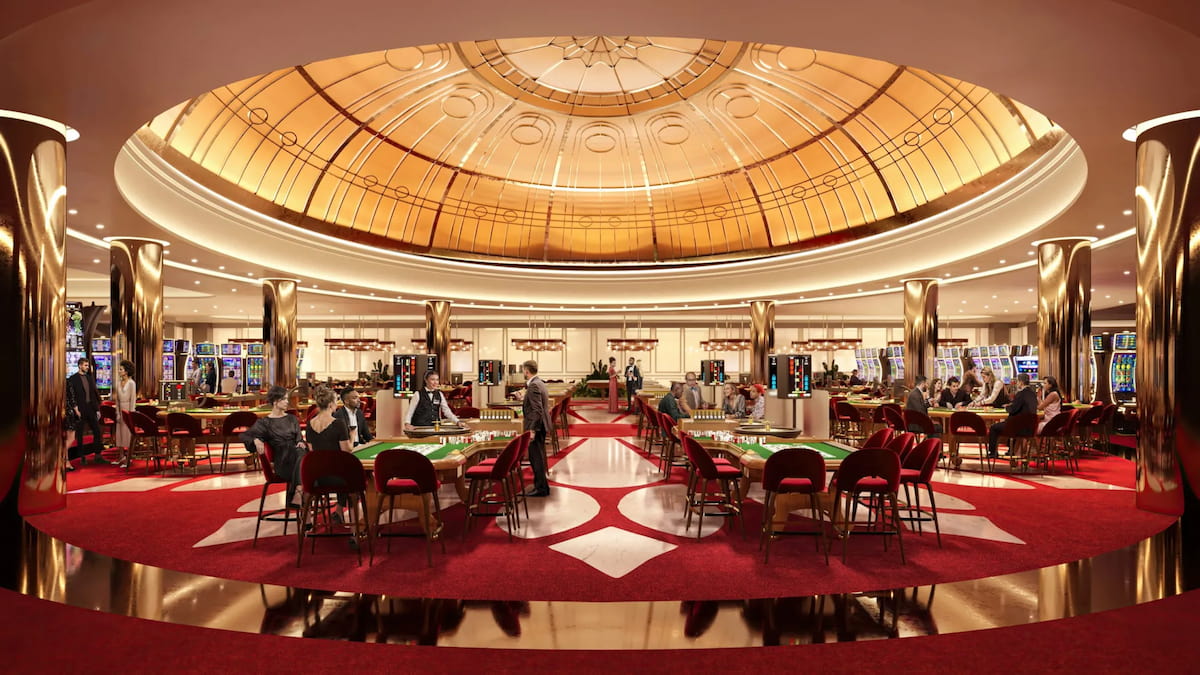
Caesars Palace Times Square, one of the eight bidders for the highly coveted downstate New York casino licenses, has unveiled its first interior renderings, offering a glimpse into what could be Manhattan’s first casino.
Local news media W42ST obtained an exclusive preview of the interior of the $5.4 billion proposal, a collaboration by SL Green Realty, Caesars Entertainment, and Jay-Z’s Roc Nation.
The developers will transform the 1515 Broadway office tower into a luxury casino resort, featuring a 992-room hotel, a rooftop observatory, a spa, a theater, high-end restaurants, and a gaming lounge situated above street level.
Sweeping staircases, marble finishes, glass-domed ceilings, and hotel suites with skyline views highlight the interior renderings. The developers describe it as an “elevated entertainment experience,” which will complement, rather than compete with, the surrounding neighborhood.
Unlike Vegas-style casinos, there will be no gaming on the ground floor. Instead, visitors will enter through a secure lobby and intentionally choose to visit the casino floor on higher levels.
Brett Herschenfeld, Executive Vice President at SL Green and project lead, told W42ST:
“We won’t have any gaming on the ground floor. Visitors will need to enter our lobby, go through security, and choose to move upstairs onto the gaming floor — raising the barrier to entry and helping make this an intentional destination for gaming, not a place for impulse gamblers.”
While the proposal includes amenities like the SUMMIT observatory, spa, and luxury dining, it notably won’t have retail storefronts.
That’s something the developers had promised, so as not to compete with existing retail businesses in Times Square.
The partners are selling Caesars Palace Times Square as a means to boost the local economy. They forecast that it will attract 10 million additional visitors, generating $800 million in annual retail spending.
Additionally, the project is expected to generate over $7 billion in tax revenue during its first decade, creating approximately 3,800 permanent jobs.
Furthermore, it would drive around $26 billion in spillover revenue to nearby hotels, theaters, restaurants, and retailers. The proposal also includes an $81 million public safety plan.
Caesars Palace Times Square is one of three Manhattan casino proposals, which face more opposition than some other bidders in the other boroughs. Opposition was a primary factor in Wynn Resorts‘ decision to withdraw its Hudson Yards project.
Caesars faces pushback from multiple local associations and trade groups, primarily serving the interests of the theater industry. They include the Broadway League, IATSE, Sardi’s, The Shubert Organization, and block associations, claiming the casino will raise crime, gambling addiction, and destroy the theater district.
State Sen. Brad Hoylman-Sigal, who will likely be the next Manhattan Borough President, also opposes the casino.
Still, Caesars Palace Times Square also has a significant backing. The developers claim they have support from over 200 businesses and organizations, including Wundham CEO Geoff Ballotti.
Recently, it received backing from civil rights activist Rev. Al Sharpton and Ryan Williams, founder of the real estate investment platform Cedre.
In a move to gain local support, Caesars teamed up with Sharpton and Williams to invite local households to participate in the project through $500 ownership stakes.
The Times Square casino project is one of eight contenders for three licenses. The remaining options are:
After numerous delays, the licensing process has reached a crucial stage. The application deadline was on June 27. Now, each proposal must secure approval from at least four out of a six-member Community Advisory Committee. The committee votes are due by September 30.
Additionally, some projects are still undergoing zoning changes as part of the rezoning Uniform Land Use Review Procedure and must complete an environmental assessment under the State Environmental Quality Review Act.
Once they pass these hurdles, the projects will advance to the final evaluation by New York’s Gaming Facility Location Board. The board is expected to make a decision and award the licenses by the end of the year.